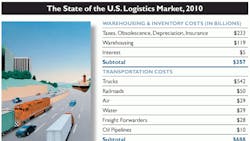Manufacturers don't usually find cause to complain when costs go down, but then again, the global recession has proven to be not just your typical economic downturn. Transportation costs were down by 20% in 2009, which sounds like good news until you consider exactly why they were down so dramatically. The formula is pretty basic: Manufacturers were making fewer products, so the transportation companies had less freight to move, leading them to lower their prices to grab what little business there was from the manufacturers.
How bad has it been for transportation and warehousing companies? According to Rosalyn Wilson, senior business analyst with consulting firm Delcan, U.S. business logistics companies as a whole saw revenues decline by $244 billion in 2009 alone, and by nearly $300 billion during the recession.
"The logistics industry felt the negative effects of the recession more than most other industries because the downturn in each individual sector [trucking, rail, air, etc.] translated into a loss in shipment volume," Wilson points out. All told, the U.S. logistics industry contracted by 18.2% in 2009.
The good news, as described in the 2010 State of Logistics Report, authored by Wilson and released by the Council of Supply Chain Management Professionals, is that the recession in the supply chain appears to be over. "Inventories have hit rock bottom, orders are being placed and commodities are moving again," Wilson observes. Even so, manufacturers were slow to respond to the recession, taking much longer to respond to increasing inventories than they did during the 2001 recession, which proved to be of much shorter duration. One possible reason for the severity of the current recession? Offshoring.The typical response from manufacturers to the recession was to follow very lean ordering practices. "Often suppliers were called on to hold the supplies in their inventory to reduce the manufacturer's exposure," Wilson notes. "Their suppliers followed suit and cut back on what they held in inventory." She points to instances of manufacturers shutting down production lines because they did not have the necessary materials and parts to produce finished products, and cautions, "We could see more of this because of lengthy delivery times."
Looking forward, Wilson projects that transportation rates are going to rise as the need for the carriers' services picks up and they shift back to a "seller's market" pricing metric. Manufacturers, she says, "would be wise to be first at the table negotiating rates and capacity -- guarantee a minimum level of business in return for guaranteed carriage or limited rate hikes two or three years out." It also wouldn't be a bad idea to offer more generous terms to weak links in your supply chain to ensure the survival of your suppliers.
See also: Manufacturers and 3PLs: A Match Made a Bit South of Heaven
About the Author
Dave Blanchard
Senior Director of Content
Focus: Supply Chain
Call: (941) 208-4370
Follow on Twitter @SupplyChainDave
During his career Dave Blanchard has led the editorial management of many of Endeavor Business Media's best-known brands, including IndustryWeek, EHS Today, Material Handling & Logistics, Logistics Today, Supply Chain Technology News, and Business Finance. He also serves as senior content director of the annual Safety Leadership Conference. With over 30 years of B2B media experience, Dave literally wrote the book on supply chain management, Supply Chain Management Best Practices (John Wiley & Sons, 2010), which has been translated into several languages and is currently in its second edition. He is a frequent speaker and moderator at major trade shows and conferences, and has won numerous awards for writing and editing. He is a voting member of the jury of the Logistics Hall of Fame, and is a graduate of Northern Illinois University.
